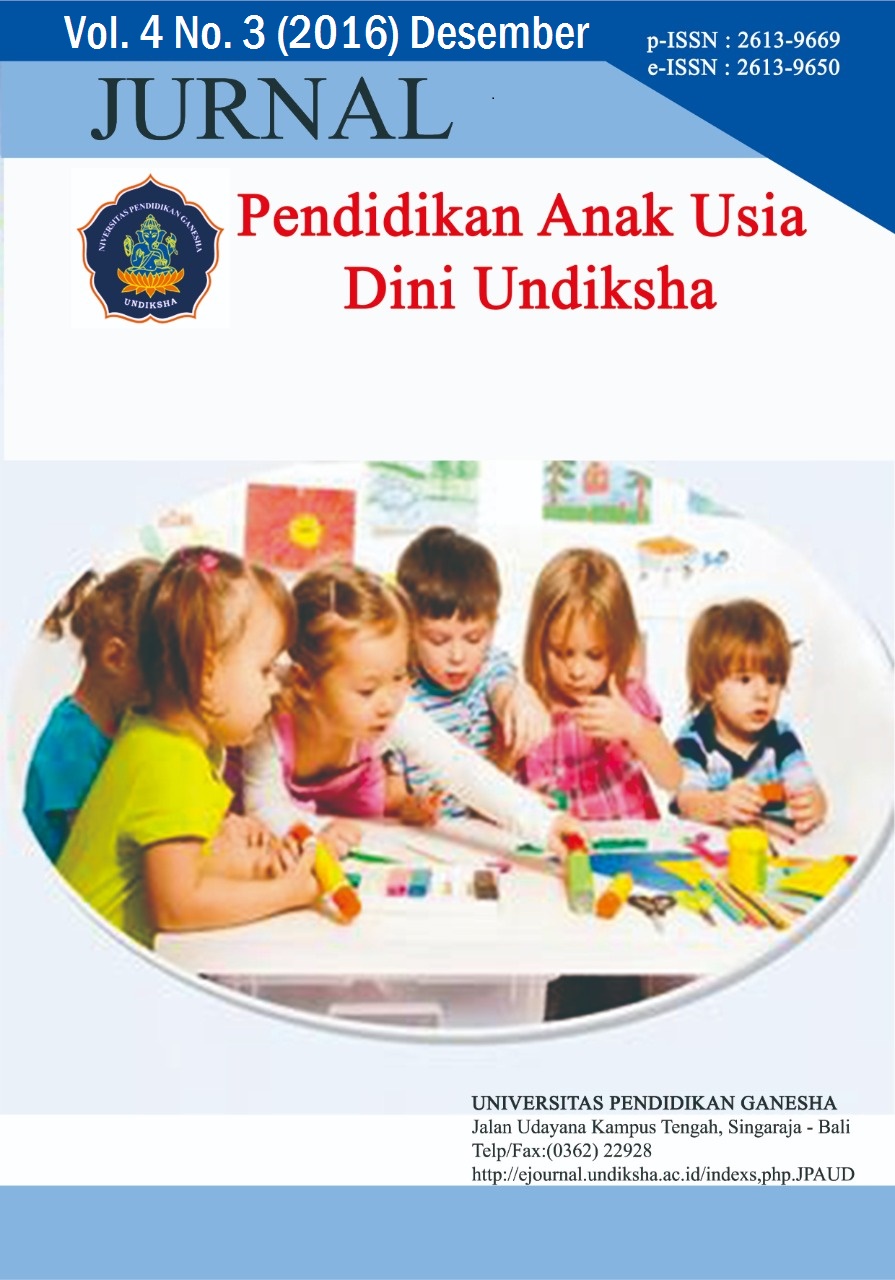PENERAPAN PERMAINAN TRADISIONAL ENGKLEK UNTUK MENINGKATKAN KEMAMPUAN MOTORIK KASAR PADA ANAK KELOMPOK B DI PAUD WIDHYA LAKSMI SINGARAJA TAHUN AJARAN 2015/2016
DOI:
https://doi.org/10.23887/paud.v4i3.8548Abstract
Penelitian ini didasari atas permasalahan yang ditemukan dari hasil observasi yaitu kurangnya partisipasi anak mengikuti kegiatan yang berhubungan dengan motorik kasar. Hal ini disebabkan karena kegiatan yang selalu monoton serta kurangnya di adakan permainan yang mampu mengembangkan kemampuan motorik kasarnya.Penelitian ini bertujuan untuk mengetahui peningkatan kemampuan motorik kasar setelah diterapkannya permainan engklek pada anak kelompok B semester II di PAUD Widhya Laksmi Singaraja Tahun Pelajaran 2015/2016. Jenis penelitian ini adalah penelitian tindakan kelas yang dilaksanakan dalam dua siklus dan subjek sebanyak 28 anak kelompok B semester II di PAUD Widhya Laksmi Singaraja Tahun Pelajaran 2015/2016. Data penelitian tentang kemampuan motorik kasar dikumpulkan dengan metode observasi dengan instrumen berupa lembar format observasi. Data yang diperoleh selanjutnya dianalisis dengan tehnik analisis statistik deskriptif.Data hasil penelitian dianalisis dengan menggunakan metode analisis statistik deskriptif dan metode analisis deskriptif kualitatif. Hasil analisis data menunjukan bahwa terjadi peningkatan rata-rata skor kemampuan motorik kasar pada anak kelompok B setelah diterapkan permainan tradisional engklek pada siklus I sebesar 56,33% yaitu kategori rendah kemudian pada siklus II menjadi 88% yang berada pada kategori tinggi. Jadi terjadi peningkatan kemampuan motorik kasar anak setelah diterapkan permainan tradisional engklek sebesar 24,17%.Kata Kunci : permainan tradisional, kemampuan motorik kasar
This research based on the problem that found from observation result, that child’s participation in following the activities about hard motoric were less. This thing caused the activities were done always about the same thing, and also seldom to do the game who able to improve the child’s hard motoric ability after implementing of tradisional game of engklek toward children ub group B on second semester at Widhya Laksmi Kindergarten of Singaraja in academic years 2015/2016. This research was classroom action research, that already done in two cyles, with 28 children of group B at Widhya Laksmi Kindergarten as subject. The data was collected by observation method, with obervation sheet of paper as the instrument. The collected data was analyzed used descriptive statistic technique. The data from the research resul was analyzed by descriptive qualitative methods. The analyze result showed that the mean scores of the hard motoric ability of the children in group B is increasing after implemented traditional game of engklek in fist cycle amount 56,33% (low category), and then in second cyles become 88% (high category). So that, the child’s hard motoricis increased after implemented traditional game of engklek amount 24,17%.
keyword : traditional game, hard motoric ability
Published
2016-10-27
How to Cite
., K. T. M., ., L. P. P. M. S. M., & ., M. M. S. (2016). PENERAPAN PERMAINAN TRADISIONAL ENGKLEK UNTUK MENINGKATKAN KEMAMPUAN MOTORIK KASAR PADA ANAK KELOMPOK B DI PAUD WIDHYA LAKSMI SINGARAJA TAHUN AJARAN 2015/2016. Jurnal Pendidikan Anak Usia Dini Undiksha, 4(3). https://doi.org/10.23887/paud.v4i3.8548
Issue
Section
Articles
License
Authors who publish with the Jurnal Pendidikan Anak Usia Dini Undiksha agree to the following terms:
- Authors retain copyright and grant the journal the right of first publication with the work simultaneously licensed under a Creative Commons Attribution License (CC BY-SA 4.0) that allows others to share the work with an acknowledgment of the work's authorship and initial publication in this journal.
- Authors are able to enter into separate, additional contractual arrangements for the non-exclusive distribution of the journal's published version of the work (e.g., post it to an institutional repository or publish it in a book), with an acknowledgment of its initial publication in this journal.
- Authors are permitted and encouraged to post their work online (e.g., in institutional repositories or on their website) prior to and during the submission process, as it can lead to productive exchanges, as well as earlier and greater citation of published work. (See The Effect of Open Access)











